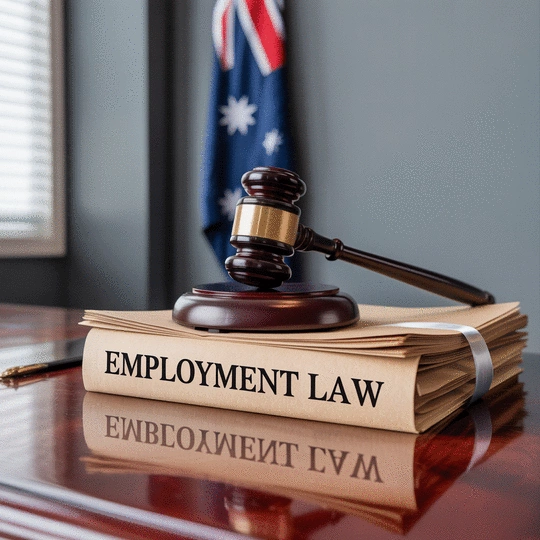Steps After Unfair Dismissal Australia

Posted on: 2025-10-29
By: Clara Thompson
Understanding your rights in the workplace is not just beneficial; it's essential. With 1 in 5 Australian workers fearing unfair dismissal, having a firm grasp on what constitutes unfair dismissal can significantly impact your career and well-being.
What You Will Learn
- Unfair dismissal occurs when an employee is terminated in a manner that is harsh, unjust, or unreasonable, as defined under the Fair Work Act 2009.
- Key components of an unfair dismissal claim include the reason for dismissal, the process followed, employment duration, and employee status.
- Common misconceptions about unfair dismissal can lead to confusion; not every termination is subject to challenge under the law.
- Timeliness is crucial; you must file your unfair dismissal claim within 21 days of your termination to avoid losing your right to seek justice.
- Seeking professional legal guidance early on can enhance your chances of a favorable outcome; lawyers provide expertise and support throughout the process.
- Taking proactive steps, such as reviewing your employment contract and utilizing online resources, can empower you in your unfair dismissal claim.
Key Elements of Unfair Dismissal Claims
Understanding the fundamentals of unfair dismissal claims can help employees take necessary actions when facing a dismissal. Below are the crucial components to consider:
Reason for Dismissal
Was there a valid reason for your termination?
Process Followed
Did your employer follow proper procedures during the dismissal?
Employment Duration
How long were you employed before the dismissal?
Employee Status
Were you a permanent employee or on a fixed-term contract?
Understanding Unfair Dismissal in Australia
Unfair dismissal can be a confusing topic, but it’s important to grasp its meaning under Australian law. In simple terms, an unfair dismissal occurs when an employee is terminated from their job in a manner that is harsh, unjust, or unreasonable. It’s critical to understand what qualifies as unfair dismissal to protect your rights in the workplace. Let’s dive into the details!
Defining Unfair Dismissal Under the Fair Work Act 2009
The Fair Work Act 2009 serves as the cornerstone of unfair dismissal law in Australia. This Act outlines the rights and obligations of both employers and employees regarding termination. Essentially, if your dismissal doesn’t meet the legal standards laid out in this Act, it may be considered unfair. Understanding these definitions can empower you to stand up for your rights.
Key Components of an Unfair Dismissal Claim
When considering an unfair dismissal claim, several key components come into play:
- Reason for Dismissal: Was there a valid reason for your termination?
- Process Followed: Did your employer follow proper procedures during the dismissal?
- Employment Duration: How long were you employed before the dismissal?
- Employee Status: Were you a permanent employee or on a fixed-term contract?
These elements are crucial in determining whether your dismissal was unfair. It’s essential to reflect on your situation and gather evidence that supports your claim.
Common Misconceptions About Unfair Dismissal
Many people have misconceptions about what constitutes unfair dismissal, leading to confusion. For example, some individuals believe that any termination can be challenged, which isn’t the case. Unfair dismissal laws are specific, and not every termination qualifies. It’s vital to understand the nuances of your situation to avoid unnecessary frustration!
Legal Framework Surrounding Unfair Dismissal
The legal framework surrounding unfair dismissal is designed to balance the rights of employees and the needs of employers. The Fair Work Commission plays a significant role in adjudicating claims, ensuring that both parties have a chance to present their side. It’s worth noting that the framework is also influenced by various factors such as industry standards and employment contracts. For more detailed information, the Fair Work Commission website provides comprehensive resources on unfair dismissal applications.
If you’re facing a dismissal, don’t hesitate to reach out for help! At Employment Law Solutions, we aim to provide clear and practical insights to help you navigate these complex issues.
Your Rights and Eligibility Criteria
Understanding your rights is fundamental when it comes to unfair dismissal. It’s crucial to know if you’re eligible to lodge a claim and what those rights entail. Let’s break down the key points!
Pro Tip
Did you know? Keeping a detailed record of events leading up to your dismissal can significantly strengthen your unfair dismissal claim. Document conversations, emails, and performance reviews to create a comprehensive timeline. This evidence can be invaluable when presenting your case to legal professionals.
Frequently Asked Questions About Unfair Dismissal
- What constitutes unfair dismissal in Australia?
- Unfair dismissal occurs when an employee is terminated in a manner that is harsh, unjust, or unreasonable, as defined under the Fair Work Act 2009.
- What are the key components of an unfair dismissal claim?
- Key components include assessing the reason for dismissal, the process followed by the employer, the employee's duration of employment, and their employment status (e.g., permanent vs. fixed-term contract).
- Are all terminations considered unfair dismissal?
- No, not every termination qualifies as unfair. Unfair dismissal laws are specific, and a dismissal must meet certain legal criteria outlined in the Fair Work Act 2009 to be considered unfair.
- How long do I have to file an unfair dismissal claim?
- Timeliness is crucial; you must file your unfair dismissal claim within 21 days of your termination. Delaying beyond this period can result in losing your right to seek justice.
- Why is legal guidance important when facing unfair dismissal?
- Seeking professional legal guidance early can significantly enhance your chances of a favorable outcome. Lawyers provide expertise, help gather necessary documentation, negotiate on your behalf, and offer support throughout the complex process.
Wrapping Up: Key Takeaways on Unfair Dismissal
As we conclude our exploration of unfair dismissal, it’s essential to remember that understanding your rights is the first step toward protecting them. Unfair dismissal can be a distressing experience, but knowing the key aspects of your case can make a significant difference. In Australia, the Fair Work Act 2009 provides a clear framework, but timelines and legal guidance are critical in navigating the process effectively.
Timeliness is crucial when it comes to lodging a claim. Remember the 21-day rule: you must file your application within this period after your dismissal. Delaying could mean losing your chance to seek justice! By being proactive and seeking professional help early on, you ensure that you have the best chance of a favorable outcome. Don’t hesitate to lean on experts who understand employment law, like those found at Employment Law Solutions.
Importance of Timeliness and Legal Guidance
When facing unfair dismissal, seeking legal guidance quickly can be a game-changer. Ensure you consult with professionals who have experience in employment law. This could be essential in understanding your rights and the best steps to take next.
Here are a few reasons why professional help is vital:
- Expertise: Legal professionals can interpret complex laws and provide tailored advice.
- Documentation: They can help you gather the necessary evidence for your claim.
- Negotiation: Experienced lawyers can negotiate on your behalf, increasing the chances for a favorable result.
- Support: Navigating the emotional toll of unfair dismissal is easier with expert support.
Call to Action: Next Steps for Employees Facing Unfair Dismissal
If you find yourself in a situation of unfair dismissal, don’t wait to take action! The sooner you reach out to legal professionals, the better your chances of a successful claim. Remember, Employment Law Solutions is here to help guide you through the complexities of the law.
Consider the following steps as you move forward:
- Contact a Legal Professional: They can provide the specialized advice you need.
- Utilize Online Resources: Look for eligibility quizzes and checklists that can clarify your situation.
- Review Your Employment Contract: Ensure you understand the terms regarding termination and notice.
- Explore Support Networks: Organizations and communities can offer emotional and financial assistance during this challenging time.
Understanding your rights, seeking help, and taking timely action can empower you in your fight against unfair dismissal. Remember, knowledge is your strongest ally. What will your next step be?
Recap of Key Points
Here is a quick recap of the important points discussed in the article:
- Definition: Unfair dismissal occurs when an employee is terminated in a manner that is harsh, unjust, or unreasonable under the Fair Work Act 2009.
- Key Components: Essential elements of a claim include the reason for dismissal, the process followed, employment duration, and employee status.
- Common Misconceptions: Not all terminations qualify as unfair; it’s essential to understand the specific legal criteria involved.
- Timeliness: Ensure to file your unfair dismissal claim within the 21-day period following your dismissal to avoid losing your right to seek justice.
- Seek Professional Help: Consulting legal professionals early can provide essential guidance and support throughout the process.
 Understanding your rights in the workplace is not just beneficial; it's essential. With 1 in 5 Austr
Understanding your rights in the workplace is not just beneficial; it's essential. With 1 in 5 Austr
 Understanding unfair dismissal appeals can feel like navigating a maze. Did you know that nearly 20%
Understanding unfair dismissal appeals can feel like navigating a maze. Did you know that nearly 20%
 Contract compliance is more than just a legal obligation—it's a cornerstone of effective business
Contract compliance is more than just a legal obligation—it's a cornerstone of effective business
